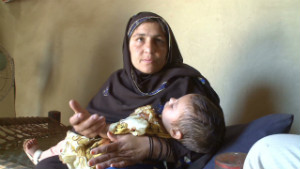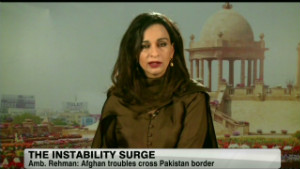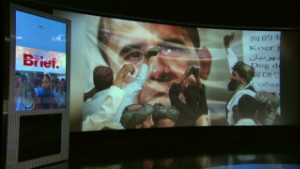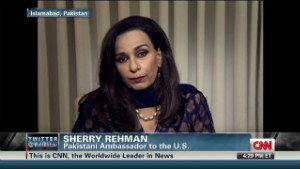Last month, local Taliban militants prohibited polio vaccines over the United States' use of drone strikes in the region.
When a three-day
nationwide effort to administer polio vaccines began this week,health
workers and volunteers weren't able to immunize children in North and
South Waziristan.
Under this security
situation, they "obviously cannot operate," said Mazhar Nisar, the
health education adviser in the Pakistani prime minister's polio
program. "We're hoping that the campaign will resume in the near
future."
 Bin Laden raid hurts polio campaign
Bin Laden raid hurts polio campaign
 'Drones completely counterproductive'
'Drones completely counterproductive'
 A troubled political relationship
A troubled political relationship
 Pakistan satisfied with Clinton's sorry
Pakistan satisfied with Clinton's sorry
Throughout the rest of
the country, vaccination efforts continued as 180,000 health workers and
volunteers fanned throughout communities trying to immunize 34 million
children, under the age of 5.
The vaccine ban began in June after a Taliban commander in northwest Pakistan declared in a statement that the vaccines "would be banned in North Waziristan until the drones strikes are stopped."
The commander, Hafiz Gul
Bahadur said that the drone strikes "are worse than polio," and
consulted with other Taliban leaders regarding the decision, according
to the statement. Drone strikes are widely unpopular, as the Pakistani
government has pressed the U.S. administration to stop the attacks. 20 dead in drone attack in Pakistan
Pakistan remains one of
the three countries in the world grappling with polio. The country has
had 22 reported cases this year. The other two countries are Afghanistan
with 11 cases and Nigeria with 54.
Polio is highly contagious and
can cause paralysis, breathing problems, deformities and death. There
is no cure for polio, so the focus lies on vaccines to prevent the
disease.
The vaccine is administered orally, and in multiple doses to achieve full immunity.
Pakistan's tribal regions are areas where polio is known to be active, according to disease data.
"In a situation like this, any child who has not been administered for polio vaccine remains at risk," Nisar said.
Vaccination points have been set up in the entry and exit points to the tribal areas, he added.
The WHO, Center for Disease Control and Prevention, UNICEF and Rotary International have a joint polio eradication campaign.
"Our concern is reaching
every single child possible," said Michael Coleman, a communication
specialist for UNICEF and polio. "Where there are limitations presented,
it's a concern."
To date, Pakistan "has had real progresses," said Coleman. "People are being reached, we need to be keeping that momentum up."
This is not the first time that Pakistan's polio campaign has made headlines.
Last year, a Pakistani
doctor was linked to a CIA operation to verify Osama bin Laden's
whereabouts with a door-to-door vaccination campaign in the town of
Abbottabad, where the al Qaeda leader was hiding before he was killed.
U.S. officials have said
the plan did not work, but aid groups and Pakistani health officials
have said the CIA's alleged meddling with a vaccination campaign
undermined Pakistan's efforts to eradicate polio.
The ban on the polio vaccine has drawn criticism.
"Proscribing inoculation
merely because some score is to be settled with the U.S. or the
government is again an act of extremist proportions that would earn the
Taliban more public anger," stated an editorial from The Nation, a Pakistani newspaper.
Nisar pointed out that both Western and Islamic countries have eradicated polio through vaccines.
"There is no reason why
Pakistan cannot do it," he said. "This message needs to be disseminated,
it needs to be reinforced. This is a campaign which saves the children
from permanent disability. There cannot be a reason to deny one's
children of this facility."
No comments:
Post a Comment